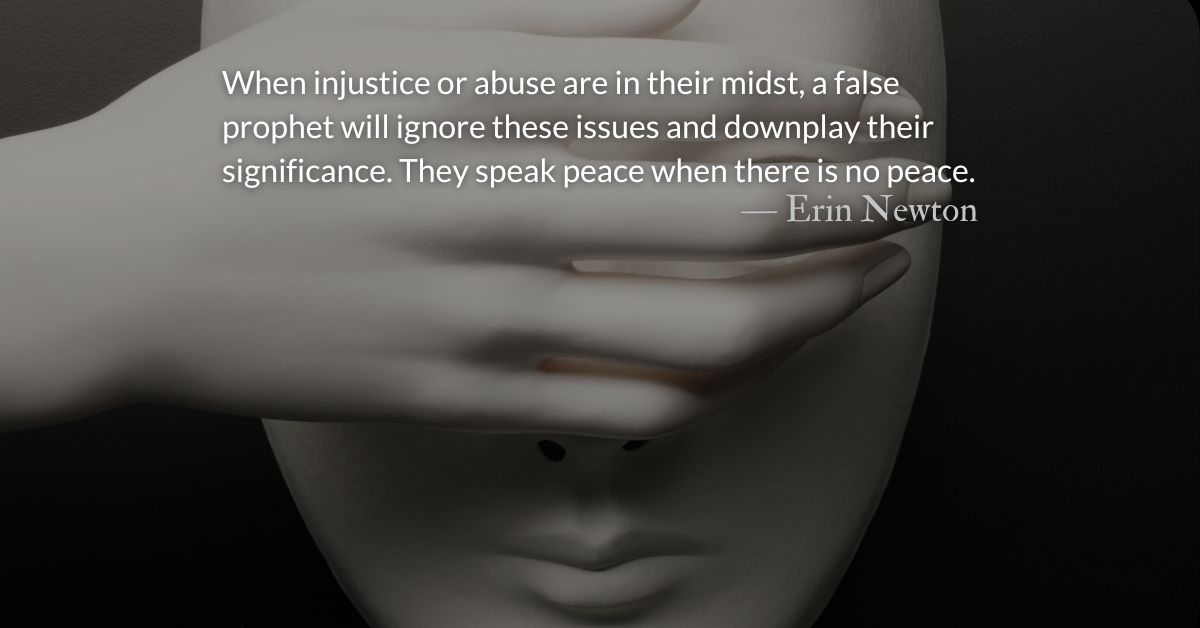Scripture Focus: Ezekiel 13:6, 10
6 Their visions are false and their divinations a lie. Even though the Lord has not sent them, they say, “The Lord declares,” and expect him to fulfill their words…
10 “‘Because they lead my people astray, saying, “Peace,” when there is no peace.
Reflection: What is a False Prophet?
By Erin Newton
There is no single word in Hebrew to designate a false prophet from a legitimate prophet. In the New Testament, the Greek language provides a word, pseudoprophetes. Quite clearly, we see the two words combined: pseudo + prophet. This is a phony, fake, counterfeit speaker for God.
In the Old Testament, they are referred to generically as “prophets” without a specific qualifying word to denote falsehood. How do we know it is a false prophet?
In Ezekiel, false prophets spoke out of their own imagination but claimed they had the words of God. They spoke about peace when there was none. They created a sense of security, that was merely a façade, a prop. God speaks against these imposters and declares their coming ruin.
There is a good warning here from the lack of a Hebrew word for false prophets. They have the same titles as legitimate pastors, priests, reverends, and leaders. By name, they are just like those who speak the words of God, the words of truth. How will we know if those among us are false prophets?
When every religious leader claims to be speaking truth, declaring the words of God, heralding their interpretation as “gospel,” what will be the litmus test for all these words? The example in Ezekiel reveals two things to look for: ignoring the reality of suffering and avoiding convicting or uncomfortable messages.
False prophets will tickle the ear of their audience with words of false peace. When injustice or abuse are in their midst, a false prophet will ignore these issues and downplay their significance. They speak peace when there is no peace.
False prophets build a sense of security for their audience by erecting walls that are nothing more than paper mâché. This may look like claims of financial or physical blessings as a way to ward off suffering in life. This may be the call to rely on political parties or elected officials to keep evil from encroaching on one’s way of life. They will claim that nothing can harm you as long as you [fill in the blank.]
These messages cannot be supported by the whole of Scripture. Look at Job. Look at Esther. Look at Paul. These were all righteous people who suffered personally or had to walk through the hardship of suffering around them.
False prophets call themselves authentic; we must learn the difference.
Divine Hours Prayer: The Refrain for the Morning Lessons
Let not those who hope in you be put to shame through me, Lord God of hosts; let not those who seek you be disgraced because of me, O God of Israel. — Psalm 69.7
– From The Divine Hours: Prayers for Summertime by Phyllis Tickle.
Today’s Readings
Ezekiel 13 (Listen 4:14)
Romans 16 (Listen 3:30)
Read more about Sufferings and False Prophets
False prophets today may be religious or political…what they have in common is telling us exactly what we want most to hear.
Read more about Cut and Run from False Prophets
Zechariah’s audience knew that lying prophets were deadly. Their lies killed.






